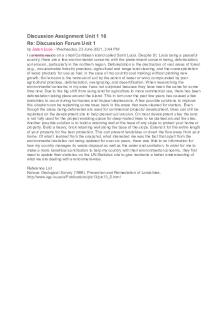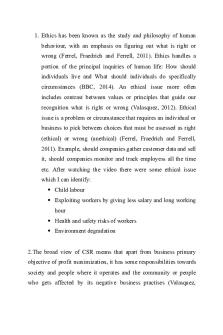Business Ethics Unit 1 Discussion Assignment PDF

| Title | Business Ethics Unit 1 Discussion Assignment |
|---|---|
| Course | Business Law, Ethics and Social Responsibility |
| Institution | University of the People |
| Pages | 4 |
| File Size | 88.4 KB |
| File Type | |
| Total Downloads | 96 |
| Total Views | 139 |
Summary
Download Business Ethics Unit 1 Discussion Assignment PDF
Description
Business Law, Ethics and Social Responsibility Unit 1 Discussion Assignment: For this assignment write at least 300 words answering the following prompts:
Using the readings for this unit as a guide, discuss what you see as the role of ethics as it pertains to management and managers. Does management, in your view, help shape the values and ethics of an organization? What about an organization’s sustainability efforts and commitment? On whom does the responsibility to consider sustainability fall? Is employee behavior, ethical or not, a by-product of the organization's ethical climate? What ideally is the manager's role in helping to create and maintain organizational integrity? Using your professional experience as a backdrop, provide examples of managers who have demonstrated ethical behavior (or not) and discuss how this affected the organization, the employees, etc. You might actively consider and incorporate sustainability-related efforts and behaviors in your analysis and reply.
Ethics is a set of standards that govern the conduct of a person. Business ethics provide reasons for how things ought to be in the economic world (Business Ethics, 2012). The ethical beliefs reflect the values, practices, and policies that shape the choices made by decision-makers on behalf of their organization (Sarie, 2015). Ethical behavior is essential in an organization as it defines what is right and what is wrong, which helps the management to make sound decisions and also to solve conflicts. Every organization has a code of ethics that defines the expected set of behaviors or actions that should be practiced and followed in an organization. However, this alone cannot be termed as sufficient for managers to come to good decisions unless they are supported by the same values in all other aspects of the organization. Ethical leadership allows ethical decisions to be made which depicts equality in the work environment. This leads to satisfied and motivated employees. The actions of the top-level management should be based on good ethical values as it helps to form the ethical-climate of the organization. Such actions act as a set standard that the employees follow, and eventually define their behaviors too. The same is
with the products of such companies. The consumers tend to have a more positive image and increased trust while purchasing products of organizations where good ethics are valued and promoted. Hence, ethics plays an important role in the effective management of organizations. It is natural that the actions and decisions made by the management affect everyone in the organization. The values that are practiced by the management in the organization are followed by all the other members as well. These practices convey direct messages to the employees of what is right, what is wrong, and what is accepted in the company. Hence, management plays a vital role to help shape the values and ethics of an organization.
The rise in technological advancements has made it easier for companies to increase their production, reach a larger market, and thus, increase the profit levels. However, the company needs to survive in the environment and hence, needs to learn to adapt and grow together by focusing on economic development, social inclusion, and environmental sustainability. Sustainability is living in harmony with the natural world, while simultaneously and actively working to protect and preserve it from irreversible damage. We have been made aware that the consequences of neglecting sustainability can be vital as it causes increased extinction rates, depletion of natural resources, and climate change. Hence, the responsibility of a company is not only towards its employees and customers but also towards the environment. Hence, as per the Brundtland report, 1987, the need is for a sustainable development that meets the needs of the present without compromising the ability of future generations to meet their own needs (Emas, 2015). This summarizes that there should be ethics in sustainability too, the responsibility of which falls not only in the management but all members of the organization.
Organizational integrity is formed by the ethical integrity of the individual actors, the ethical quality of their interaction as well as that of the dominating norms, activities, decision-making procedures, and results within a given organization (Palazzo, 2007). The management needs to provide and explain the set standards of ethical behaviors and ensure responsible conduct of the same to create and maintain organizational integrity. The set standards should be the same for all members of the organization and the saying ‘practice what you preach’ must be followed. The management should also take necessary actions against the wrongdoers and opt for an integritybased approach to ethics management that combines a concern for the law with an emphasis on managerial responsibility for ethical behavior (Paine, 1994).
When I was working in Kepy Cement, a cement manufacturing company, there was a case of an unethical practice that caused a negative impact on the company. The management made an announcement that sales order could be given by all the employees of the company, hoping that it would increase sales and promised to provide sales incentives on each order. The management forgot to mention that this decision is applicable to orders from new parties only. This loophole led the employees to fight for orders from existing buyers which led to a bad relationship among coworkers. This also caused the existing buyers to feel harassed as they were getting call requests for the next order from many employees. Eventually, the management had to revoke the new decision.
References
Business Ethics (2012). Retrieved from http://2012books.lardbucket.org/books/businessethics/index.html
Emas, R., (2015). Brief for GSDR 2015; The Concept Of Sustainable Development: Definition And Defining Principles. [online] Sustainabledevelopment.un.org. Retrieved from https://sustainabledevelopment.un.org/content/documents/5839GSDR %202015_SD_concept_definiton_rev.pdf
Paine, L., (1994). Managing for Organizational Integrity. [online] Harvard Business Review. Retrieved from https://hbr.org/1994/03/managing-for-organizational-integrity
Palazzo, G. (2007). Corporate Ethics and Corporate Governance. ISBN : 978-3-540-70817-9. Retrieved from https://link.springer.com/chapter/10.1007/978-3-540-70818-6_9
Sarie (2015). Got Ethics?. [online] SHAFARESA. Retrieved from https://rotantedolorosa.wordpress.com/2015/07/27/got-ethics/...
Similar Free PDFs

Discussion Assignment Unit 1 16
- 1 Pages

Corina assignment - business ethics
- 26 Pages

Business ethics. Assignment 2
- 11 Pages

Discussion Assignment Unit 5
- 2 Pages

Discussion assignment Unit 2
- 2 Pages

Discussion Assignment Unit 4
- 1 Pages

Discussion Assignment Unit 4
- 3 Pages

Discussion Assignment Unit 2
- 2 Pages

Discussion assignment unit 6
- 2 Pages

Discussion Assignment Unit 4
- 2 Pages

Unit 38 Business Ethics P3
- 3 Pages
Popular Institutions
- Tinajero National High School - Annex
- Politeknik Caltex Riau
- Yokohama City University
- SGT University
- University of Al-Qadisiyah
- Divine Word College of Vigan
- Techniek College Rotterdam
- Universidade de Santiago
- Universiti Teknologi MARA Cawangan Johor Kampus Pasir Gudang
- Poltekkes Kemenkes Yogyakarta
- Baguio City National High School
- Colegio san marcos
- preparatoria uno
- Centro de Bachillerato Tecnológico Industrial y de Servicios No. 107
- Dalian Maritime University
- Quang Trung Secondary School
- Colegio Tecnológico en Informática
- Corporación Regional de Educación Superior
- Grupo CEDVA
- Dar Al Uloom University
- Centro de Estudios Preuniversitarios de la Universidad Nacional de Ingeniería
- 上智大学
- Aakash International School, Nuna Majara
- San Felipe Neri Catholic School
- Kang Chiao International School - New Taipei City
- Misamis Occidental National High School
- Institución Educativa Escuela Normal Juan Ladrilleros
- Kolehiyo ng Pantukan
- Batanes State College
- Instituto Continental
- Sekolah Menengah Kejuruan Kesehatan Kaltara (Tarakan)
- Colegio de La Inmaculada Concepcion - Cebu




